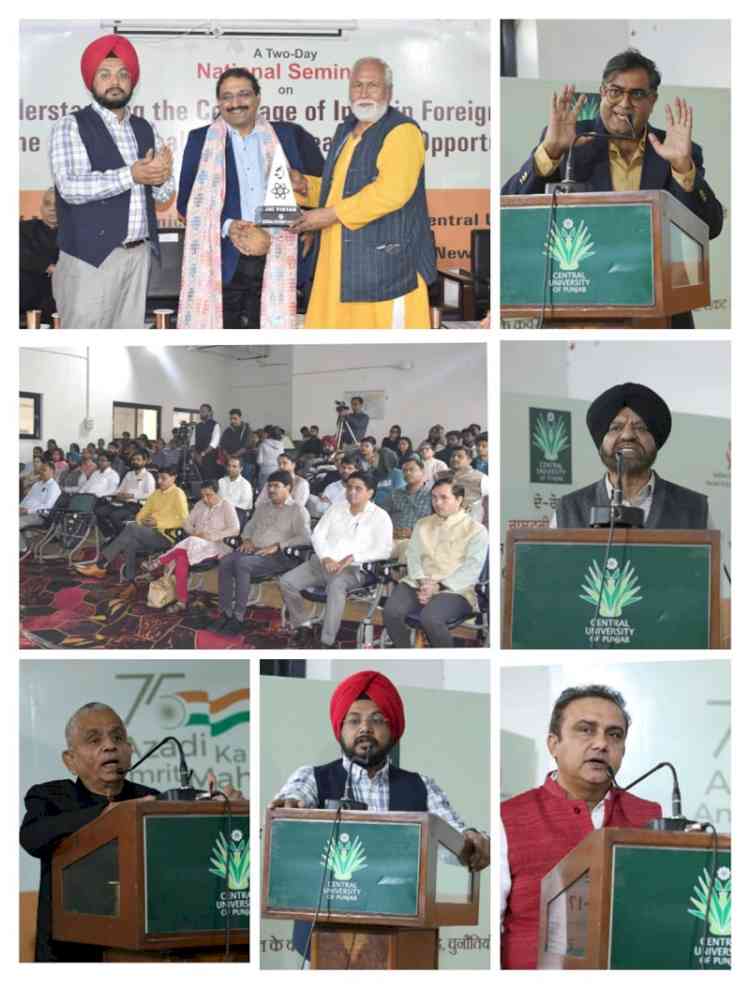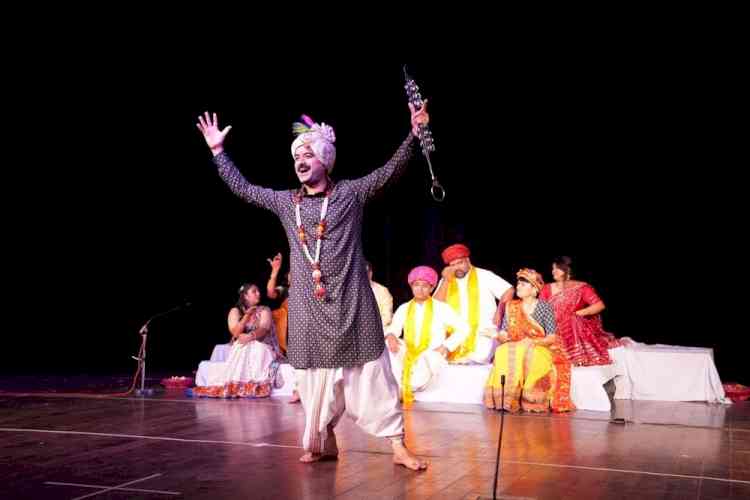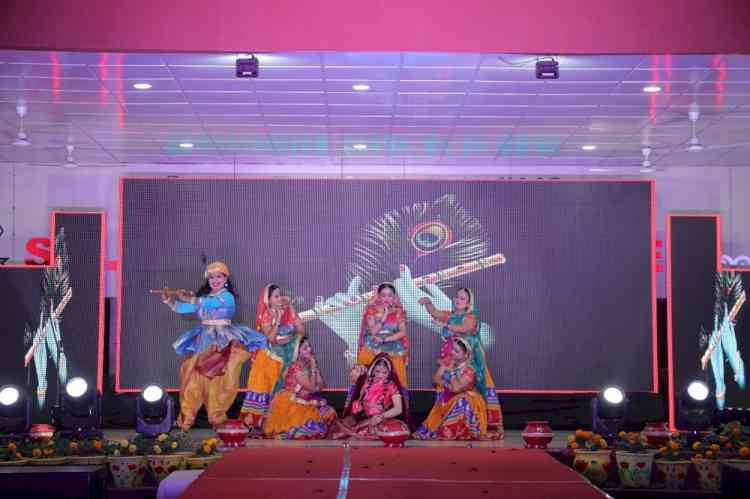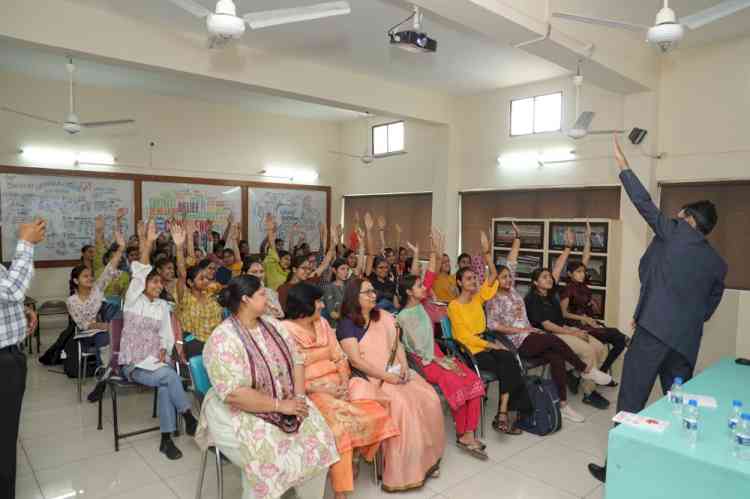ICSSR sponsored National Seminar on “Understanding the Coverage of India in Foreign Media” begins at Central University of Punjab on National Press Day
Eminent personalities of academia and media fraternity expressed their views in the inaugural session of two days ICSSR sponsored National Seminar

Bathinda, November 16: On the occasion of National Press Day, a two days ICSSR sponsored National Seminar titled “Understanding the coverage of India in Foreign Media: The Biases, Challenges, Threats, and Opportunities” commenced at the Central University of Punjab. The Dept. of Mass Communication and Media Studies at CU Punjab, under the patronage of Vice-Chancellor, Prof. Raghavendra P. Tiwari, is organizing this programme scheduled for November 16—17, 2023.
The inaugural session was graced by distinguished personalities from academia and the media fraternity. Sh. Hitesh Shankar, Editor in Chief, Panchjanya, New Delhi and Prof. (Dr) K.G. Suresh, Vice-Chancellor, Makhanlal Chaturvedi National University of Journalism and Communication (MCMUJC), Bhopal, Madhya Pradesh graced the occasion as the Chief Guest and the Keynote Speaker, respectively. Prof. (Dr) Kamlesh S. Duggal, Senior Professor of Journalism (Rtd.) Guru Nanak Dev University and OSD, GNDU College, Jalandhar attended the programme as the special guests. In addition to the above, Prof (Dr.) Ram Mohan Pathak, Former Vice Chancellor, Dakshin Bharat Hindi Prachar Sabha, Chennai and Sh. Anurag Punetha, Media Coordinator, IGNCA participated as the Guest of Honour in this session.
In the beginning, participants and distinguished guests observed two-minute silence in memory of beloved Prof. Tarun Arora, who passed away due to sudden cardiac arrest.
At the outset, Dr. Rubal Kanozia, Seminar Convener and Assistant Professor, Dept. of MCMS, CU Punjab, extended a warm welcome to the participants and introduced the programme theme. He highlighted that as one of the fastest growing economies globally, India has become a major player in the global arena and has been actively scrutinized by foreign media. Often, these foreign media outlets portray a negative image of India influenced by biases and propaganda. Dr. Kanozia emphasized that in response to this, the Indian government is implementing certain measures, such as monitoring foreign media coverage, refining messaging, and bolstering the country’s diplomacy. This seminar aims to provide a platform for discussing the biases, challenges, threats, and opportunities associated with countering foreign media bias against India.
Hitesh Shankar, the Chief Guest, stated that Western media has consistently portrayed third-world countries from their own perspective, aiming to establish supremacy and carry forward their hegemony. He emphasized the influence of the echo chamber effect created by biased reporting, suggesting that fact-checking foreign media content is essential to debunk propaganda.
While delivering the keynote address, Prof. (Dr.) K.G. Suresh emphasized that although Western media biases have increased in the past few decades, the Indian Government has effectively countered them through soft diplomacy. This has been achieved by providing assistance to neighboring countries and other developing nations during crises, aligning with the principles of Vasudhaiva Kutumbakam and Sarve Bhavantu Sukhinah. Prof. Suresh urged Indian Media Houses to disseminate information in line with our national interests and to champion territorial integrity. He delved into the global distribution of information through transnational news agencies, highlighting our continued dependence on Western-owned news syndicates. Prof. Suresh underscored the necessity of creating an Indian Global Media Platform to accurately present Bharat's image to the world.
Prof. (Dr) Kamlesh S. Duggal, the Special Guest of the programme, shed light on the role of Canada based Punjabi Media in fostering patriotic spirit and supporting the freedom movement before independence. Despite the commercialization of Canada based Punjabi Media post-independence, it continued patriotic character and efforts to connect Indian-origin families to their culture. Prof. Duggal suggested that the Indian diaspora's contributions in journalism could mark a significant impact in timely debunking biases in foreign media channels.
Prof (Dr.) Ram Mohan Pathak, the Guest of Honour of the programme, pointed out that western media in the intent to control the global dialogue has introduced embedded journalism and paparazzi. He gave examples of subjective reporting by international media houses during crucial events, encouraging participants to be active audiences and counter Western media bias on social media platforms.
Anurag Punetha, another Guest of Honour, discussed India's stance on global conflicts and its image as a nation supporting peace and prosperity. He highlighted India's impact on the global stage in space, telecommunications, economic growth, and other areas. Punetha emphasized the effective communication strategies of the Ministry of Foreign Affairs, influencing Western media journalists to recognize India's potential in solving global issues.
In his presidential address, Prof. Raghavendra P. Tiwari, the Vice-Chancellor, stated foreign media biases could only be rectified when we see ourselves with the Bharatiya mindset. He further underscored that improvement would be realized when Indian correspondents provide authentic information to their foreign counterparts, and Indian intellectuals contribute by publishing their write-ups in foreign media. Prof. Tiwari acknowledged the escalating incidents of sensationalism, overdose, and biases in news reporting, leading to a gradual dilution of objectivity over time. Consequently, he highlighted the discussions in this seminar would be meaningful for policymakers, media researchers, citizens, and most significantly, stakeholders in both foreign and Indian media outlets.
This two days National Seminar will feature three technical sessions wherein media scholars will present their research papers on various sub themes of this National Seminar. The Valedictory Session of this Seminar will be conducted on November 17, 2023. Faculty, research scholars and students from different departments are attending this programme.


 City Air News
City Air News 








